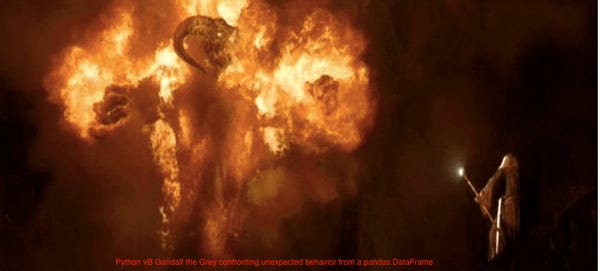Are at Least Some of Us About to Replace "Programming" wiþ "Invocation"?
The SubTuringBradBot project; should I be thinking about what the right LLM “Grimoire” would look like?…
Part of: SubTuringBradBot…
The elective affinity in thought between programming and post-1000 western European conceptualizations of magic is old and strong.
For example:
Paul Dourish: THE ORIGINAL HACKER’S DICTIONARY: ‘WIZARD n. 1. A person who knows how a complex piece of software or hardware works; someone who can find and fix his bugs in an emergency. Rarely used at MIT, where HACKER is the preferred term. 2. A person who is permitted to do things forbidden to ordinary people, e.g., a “net wizard” on a TENEX may run programs which speak low-level host-imp protocol; an ADVENT wizard at SAIL may play Adventure during the day…
And:
Harold Abelson & Gerald Jay Sussman with Julie Sussman (1993): Structure and Interpretation of Computer Programs: “Computational processes are abstract beings that inhabit computers… manipulate other abstract things… data… [their] evolution… directed by a pattern of rules called a program. Programs… conjure processes… like a sorcerer’s spells… [are] carefully composed… in arcane and esoteric programming languages that prescribe the tasks…. Our processes… execute… precisely…. Thus, like the sorcerer’s apprentice, novice programmers must learn to understand and to anticipate the consequences of their conjuring…
This metaphor and analogy has been quite popular.
On the one hand, it is clearly a joke. On the other hand, it is an example of: “ha, ha: only serious”.
Now it looks like this metaphor and analogy may be taking another upward leap:
Ethan Mollick: Now is the time for grimoires: ‘It isn’t data that will unlock AI, it is human expertise…. With… Large Language Models]… I… think… the most useful thing… in this AI-haunted moment [is] creating grimoires, spellbooks full of prompts that encode… our hard-earned expertise in ways that AI can help other people apply…. Expertise…. Time with AI models…. [And] a vision of what you want the prompt to do that is focused and achievable…. What I would really like to see is large-scale public libraries of prompts, written by known experts and tested carefully for different audiences… freely available…. And robust discussions around these prompts…
The question is: Is this metaphor/analogy more illuminating or confusing?
And now it is time for me to get back to the SubTuringBradBot project—what I think is my best idea to try to make modern Transformer LLMs and other LMLMs useful to me in my life. The image stuff—I have a minor use for that. The slide-making stuff and such—that may be useful. But the problem is that I regard myself as a better writer than Chat-GPT and a much better internet searcher and results presenter than BingAI-Chat. As far as the main competences of Transformer models so far are concerned, things go more smoothly when they are not in my loop.
But can they be useful to me in cases that allow me to withdraw myself from the loop completely? I would like to find out. Hence my SubTuringBradBot project
that I have been sporadically writing about. Its aim is to figure out if a properly-trained and -tuned LLM can do any or all of the following useful tasks:

